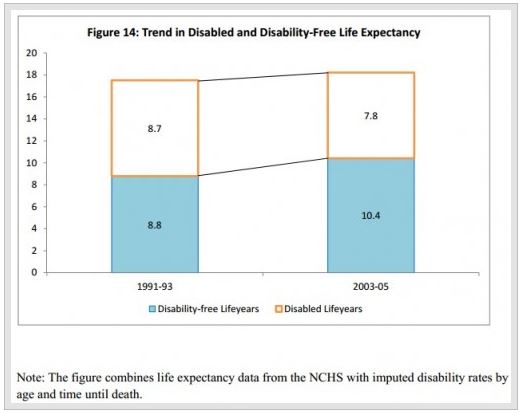Life Expectancy, Health, and the Budget
As we've written many times before, the U.S. population is aging and in doing so putting increasing pressure on Social Security, Medicare, and to some extent Medicaid. In part, this is due to rising life expectancy which has increased markedly over the last century from 47 years in 1900 to 79 years today.
Growing life expectancy, however, does not necessarily mean those additional years will be healthy and productive ones. A recent working paper by David Cutler, Kaushik Ghosh and Mary Beth Landrum from the National Bureau of Economic Research aims to explore this question. The answer: people are not only living longer but are living healthier as well.
In their research, the authors focus on three major statistics: longevity, disability, and disease prevalence. They find that in 2005, Medicare beneficiaries (for a typical person aged 65) were living 0.7 years longer than they did in 1992, but actually spending 1.6 years less of their golden years with a disability. In other words, not only are the additional years of life free of disability, but seniors have gained additional disability-free years on top of that.

Source: NBER
Importantly, the authors' findings on disease-free years is not quite as rosy, though still relatively good news. They find that of the 0.7 additional years of life expectancy, 85 percent (0.6 years) of them are disease-free. In other words, the number of years where a senior has a disease has gone up slightly, but only by a small fraction of the number of years their life expectancy has gone up.
So what are the implications of this finding? Certainly nothing definitive, but the study is suggestive that workers should be able to bear some more time in the workforce as life expectancy grows.
As we have written before, people working longer can help accelerate economic growth by increasing labor and investment, can leave workers with more security for their own retirement, and can generate important new revenue for the federal government. If public policy creates incentives for this longer work by raising the Social Security and Medicare retirement ages, it can also save substantial sums of money for those programs in order to reduce the debt and extend their solvency.
Population aging is the single biggest threat to the budget over at least the next quarter century, and anything public policy can do to bend the aging curve can certainly make things easier. This latest research offers more evidence that increasing retirement ages can be a part of the solution.

